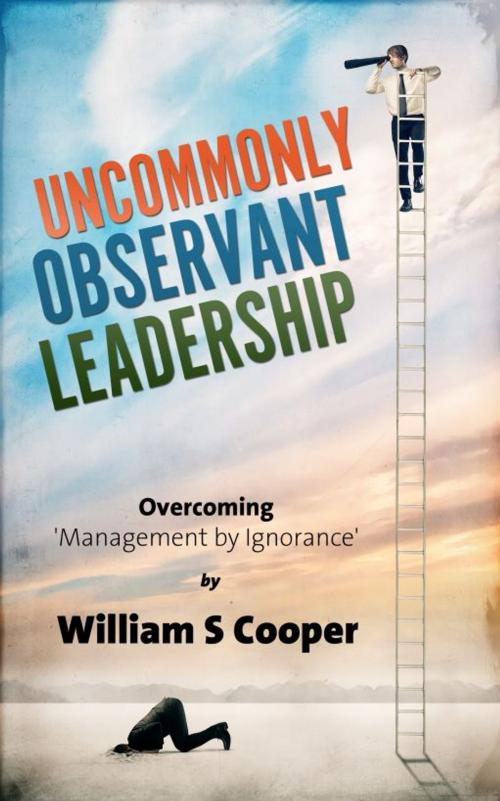Uncommonly Observant Leadership; Overcoming 'Management by Ignorance'
Business & Finance, Management & Leadership, Management Science| Author: | William Cooper | ISBN: | 9781301208609 |
| Publisher: | William Cooper | Publication: | January 13, 2013 |
| Imprint: | Smashwords Edition | Language: | English |
| Author: | William Cooper |
| ISBN: | 9781301208609 |
| Publisher: | William Cooper |
| Publication: | January 13, 2013 |
| Imprint: | Smashwords Edition |
| Language: | English |
This book discusses the limitations and misconceptions of current leadership/management practices and provides practical advice on improving organizational performance utilizing ‘Complexity Science’. There is an overview of current management philosophies and how the insights from ‘Complexity Theory' provide advanced thinking which can lead to more effective organizational outcomes.
This current situation is placing continuing demands on an organization’s ability to respond. Organizational systems are subject to stresses and strains leading to dysfunction. Very little attention is placed on developing capacity for adaption to changing environments. Maintaining long-term, sustainable organizations necessitate a re-examination of the concepts, purpose, and perspective of managerial actions and require a fresh look at some long-held assumptions about operating in complex environments.
This effort requires a new framework for thinking and talking about organizations, grounded in contemporary understandings of today’s turbulent economy.
Leaders enable an adjustable, stable configuration where your people (complex, adaptive systems) can respond to unpredictable events, such that managers will obtain the relevant information to make effective decisions needed for the organization to function. You must create an environment where accurate information is encouraged and expected, and the flow of information is unobstructed.
Management consultants are constantly updating their repertoire, offering variations on the many management themes (MBO, Management by Exception, Re-Engineering, etc.), with an emphasis on managerial, organizational, and cultural reaction to change, in an attempt to transform the business, without addressing the dynamics of the organization. Little attention is focused on comprehending the fundamentals of complex environments. Managers no longer want the standard ‘cook-book’ approach based on a particular management consultants ‘flavor-of-the-moment’, with the corresponding demoralizing processes of external evaluation and the continual retraining of managers based on outside expert’s latest ideas.
The situation was that a company moving too quickly inferred that it was out-of-control; the risk now is that a company moving too slowly infers being left behind. The transformation outcomes being offered by consultants attempt to perfect the past; but because of the radical aspects of change, managers want to use transformation to navigate the future. The typical assumptions about today’s marketplace are inadequate; there is a yearning for a more fundamental understanding of organizational dynamics to better maneuver in this chaotic and unpredictable future (new environment). Complexity Science offers advancement.
Scientific management was developed by Frederick Taylor to suggest a ‘mechanistic model’ (using the scientific method) of business based on the assumption systems behave in a linear manner; groups exist independently of each other, relate weakly, interact in simple, predictable ways, and produce behaviors that are easy to deduce, given sufficient information about their makeup.
Scientific theories have made significant progress in providing useful insights for managers/leaders. Complexity Science looks at the business environment as being characterized more by chaos than by stability. This field of study is developing methods to comprehend non-linear processes which make up the vast majority of systems. It is based on viewing the business environment as unstable and complex whose processes cause unpredictable performance that is full of surprises; that change is so pervasive and the outlook so chaotic that you can never know what the future will bring. It suggests a more open-minded approach, a competence to understand unexpected information, the alertness to re-assess the situation in light of changing events, and the skill to devise new approaches of action in uncertain environments.
This book discusses the limitations and misconceptions of current leadership/management practices and provides practical advice on improving organizational performance utilizing ‘Complexity Science’. There is an overview of current management philosophies and how the insights from ‘Complexity Theory' provide advanced thinking which can lead to more effective organizational outcomes.
This current situation is placing continuing demands on an organization’s ability to respond. Organizational systems are subject to stresses and strains leading to dysfunction. Very little attention is placed on developing capacity for adaption to changing environments. Maintaining long-term, sustainable organizations necessitate a re-examination of the concepts, purpose, and perspective of managerial actions and require a fresh look at some long-held assumptions about operating in complex environments.
This effort requires a new framework for thinking and talking about organizations, grounded in contemporary understandings of today’s turbulent economy.
Leaders enable an adjustable, stable configuration where your people (complex, adaptive systems) can respond to unpredictable events, such that managers will obtain the relevant information to make effective decisions needed for the organization to function. You must create an environment where accurate information is encouraged and expected, and the flow of information is unobstructed.
Management consultants are constantly updating their repertoire, offering variations on the many management themes (MBO, Management by Exception, Re-Engineering, etc.), with an emphasis on managerial, organizational, and cultural reaction to change, in an attempt to transform the business, without addressing the dynamics of the organization. Little attention is focused on comprehending the fundamentals of complex environments. Managers no longer want the standard ‘cook-book’ approach based on a particular management consultants ‘flavor-of-the-moment’, with the corresponding demoralizing processes of external evaluation and the continual retraining of managers based on outside expert’s latest ideas.
The situation was that a company moving too quickly inferred that it was out-of-control; the risk now is that a company moving too slowly infers being left behind. The transformation outcomes being offered by consultants attempt to perfect the past; but because of the radical aspects of change, managers want to use transformation to navigate the future. The typical assumptions about today’s marketplace are inadequate; there is a yearning for a more fundamental understanding of organizational dynamics to better maneuver in this chaotic and unpredictable future (new environment). Complexity Science offers advancement.
Scientific management was developed by Frederick Taylor to suggest a ‘mechanistic model’ (using the scientific method) of business based on the assumption systems behave in a linear manner; groups exist independently of each other, relate weakly, interact in simple, predictable ways, and produce behaviors that are easy to deduce, given sufficient information about their makeup.
Scientific theories have made significant progress in providing useful insights for managers/leaders. Complexity Science looks at the business environment as being characterized more by chaos than by stability. This field of study is developing methods to comprehend non-linear processes which make up the vast majority of systems. It is based on viewing the business environment as unstable and complex whose processes cause unpredictable performance that is full of surprises; that change is so pervasive and the outlook so chaotic that you can never know what the future will bring. It suggests a more open-minded approach, a competence to understand unexpected information, the alertness to re-assess the situation in light of changing events, and the skill to devise new approaches of action in uncertain environments.















